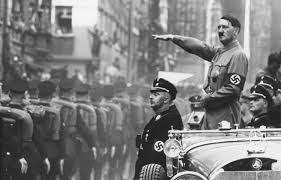
Adolph Hitler (USHMM)
Roughly one week ago, it was rare to hear anyone refer to Donald Trump as a "fascist." But with Gen. Mark Milley and Democratic presidential nominee Kamala Harris leading the way, the term became commonly attached to Trump in just a matter of days. How did that happen? Jonathan Weisman, of The New York Times proves to be a trusty guide on that question. Under the headline "Harris and Democrats Lose Their Reluctance to Call Trump a Fascist; Since Gen. Mark Milley was quoted as saying Donald Trump is “fascist to the core,” a term avoided by top members of the Democratic Party is suddenly everywhere," Weisman writes:
The word “fascist” has hovered around former President Donald J. Trump from the moment he rode down his golden escalator in 2015 to warn of Mexican rapists and drug dealers in the memorable opening of his bid for president. But for most top Democrats, it was a provocative term loaded with dread, historical import and potential incitement — best left unsaid.
Until Vice President Kamala Harris this week made clear — again and again — that it would be just fine with her to use the word.
On Tuesday, as the radio host Charlamagne Tha God interviewed Ms. Harris, he interjected as the vice president contrasted her vision with her rival’s. “The other is about fascism,” he said of Mr. Trump’s vision. “Why can’t we just say it?”
Ms. Harris’s response: “Yes, we can say that.”
It did not take other political types long to follow Harris' lead. It did not take Weisman long to pick up on it:
On Wednesday, speaking in Washington Crossing, Pa., Ms. Harris quoted Gen. Mark A. Milley, the chairman of the Joint Chiefs of Staff under Mr. Trump, describing his former boss as “fascist to the core,” as detailed in a new book from the journalist Bob Woodward.
“America,” she said, “must heed this warning.”
The quotation of Mr. Milley may have opened the floodgates for Democrats, granting new permission with the authority of his uniform and his unique closeness to the inner workings of Mr. Trump’s administration. But an element of political risk remains, even as Mr. Trump freely uses the word himself against Ms. Harris.
For years now, Democrats have avoided calling Mr. Trump a fascist in part out of fear of alienating his followers, said Timothy Snyder, a Yale historian of Central Europe and the Holocaust. For one thing, Democrats did not want a repeat of Hillary Clinton’s dismissal of Trump supporters as “a basket of deplorables.”
Even President Biden, who has made Mr. Trump’s threat to democracy central to his case against the former president for years, only inched up to the term when in 2022 he spoke of “the entire philosophy” of Mr. Trump’s movement: “I’m going to say something, it’s like semi-fascism.”
But as Mr. Trump steers his rhetoric toward nativism, racial resentment and overt threats against his political enemies, reticence has fallen away.
That third item -- Trump's overt threats against his political enemies -- prompted John Kelly, Trump's former chief of staff, to label him a "fascist" who craves "absolute power" and will "govern like a dictator." For good measure, Kelly also said Trump had expressed admiration for Adolph Hitler, claiming several times that the late Nazi leader had "done some good things."
Citizens of America led the charge to fight off the scourge of Nazism in World War II, but a significant number of Americans now tell pollsters they support Trump and plan to vote for him. Are Americans' memories really that short? Have they forgotten about the more than 405,000 Americans who gave their lives to fight off Hitler and the Nazis -- plus the countless others who put their lives at risk to save Democracy. Are these "Americans" going to go to voting sites and mark their ballots for a man who openly expresses admiration for Hitler? Anyone who would even think of doing that should be ashamed of themselves -- assuming they are capable of feeling shame. Weisman has a warning for Americans who might be thinking of voting for Trump, an admirer of the mad man behind the Nazis. Weisman writes:“You have people like General Milley, who are telling voters that Donald Trump will usher in an era of fascist America,” said Paul D. Eaton, a retired major general and leader of the liberal veterans group VoteVets. “In so many countries throughout history, we have seen fascism take hold only because the voters enabled it to take hold.”Liz Cheney, the former Republican congresswoman and staunch opponent of Mr. Trump, said Sunday on NBC’s “Meet the Press” that she had great respect for General Milley, and that “I see no reason to disagree with that assessment.”
Mrs. Clinton, Mr. Trump’s opponent in 2016, chimed in on Monday in a social media post: “Trump’s rhetoric has become blatantly fascist.”
All of that has come after Mr. Trump’s running mate, Senator JD Vance, singled out the term “fascist” as an incitement to violence that was beyond the pale.
“Vance is a very smart guy,” said Ruth Ben-Ghiat, a professor at New York University whose recent book, Strongmen, looked at autocrats and fascists from Benito Mussolini to Mr. Trump. “He knows the power of the word.”
